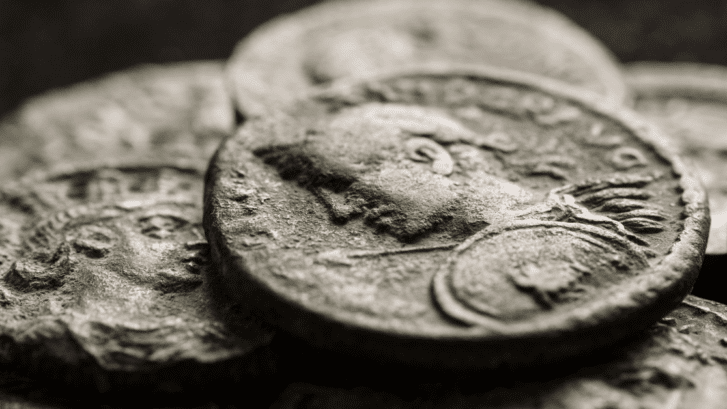The parable of the two sons, the parable of the wicked tenants and the parable of the Kings Feast all see Jesus on the attack. The first parable of the two sons where the one son told his father that he would go into the vineyard, but didn’t. Jesus points to the religious leaders as the unworthy son who doesn’t do the father’s will. Then, the parable of the wicked tenants. Jesus tells the Chief Priests and Pharisees that they are the wicked tenants.
Jesus compares the condemned guests once again with the Scribes and Pharisees-the religious leaders. In our gospel today, the Pharisees have had enough and plan a counterattack. They direct a carefully formulated question at Jesus and begin by flattering Him. They call Him, “Teacher, we know you are a truthful man and follow God’s way.” Then they ask a question while the crowd looks on. “Is it lawful to pay tax to Caesar or not?”
The crowd must have fallen silent at that because this is a loaded question, a no-win situation for Jesus. If He said they should pay tribute to Caesar then He would lose His credibility with the Jews. If He said that it was wrong to pay tribute to Caesar, then He was committing a public act of treason and the Romans could arrest Him. The silence must have been deafening while the crowd waited for Jesus to reply. What is he going to say?
How is He going to reply? He is in big trouble. “Show me the coin,” is the Lord’s answer. He is telling the crowd that He does not have the Emperor’s coins, they do. The possession of the coin is the implicit acknowledgment of Roman Sovereignty. “Whose image is this, Caesars? Then give to Caesar the things that are Caesar’s and to God the things that are God’s.” The answer infuriated them; Jesus made them look like fools again.
Their carefully laid plans had badly misfired. In one sense, that answer did not settle anything. He did not tell them what belonged to Caesar and what belonged to God. He knew that would change in every age, Jesus never laid down rules and regulations. He lays down principles, that is why His teaching is timeless. He gives us the principle, then tells us to think. Figure it out for ourselves. In a way, that is what He is doing in today’s gospel.
He makes His appeal not to some lofty principle, but to common sense. The implication is that the coin has Caesar’s picture on it, give it to him. But the most important line in today’s gospel is, give to God what is God’s. God does not want taxes, He does not need your vote. He does not need you to take up arms in His defense. But, God does deserve your heart and conscience. These should never be given to a human institution or even to a human relationship.
Your greatest love, your greatest loyalty belongs to God. The Roman coin was stamped with the image of Caesar. The human heart is stamped with the image of God. We are made in His image and likeness. Perhaps, the question is, “Shall we, can we, do we give to God what is God’s?” We all at some time in life have to make decisions; do we serve God or Caesar, good or evil? Being human, we sometimes make bad choices, and we ask the question. What should I do?
What must I do to be authentic? To live the life God has called me to live. An old Indian was sharing his wisdom with his grandson. He told the grandson that we have two wolves inside us who struggle with each other. One is the wolf of peace, love and kindness. The other is the wolf of fear, greed and hatred. “Which wolf will win, grandfather?” asked the grandson. The wise old Indian said, “Whichever you feed, whichever one you encourage.” Ask yourselves, who comes first in my life? Is Christ top of your “top ten” list? If not, why not?


